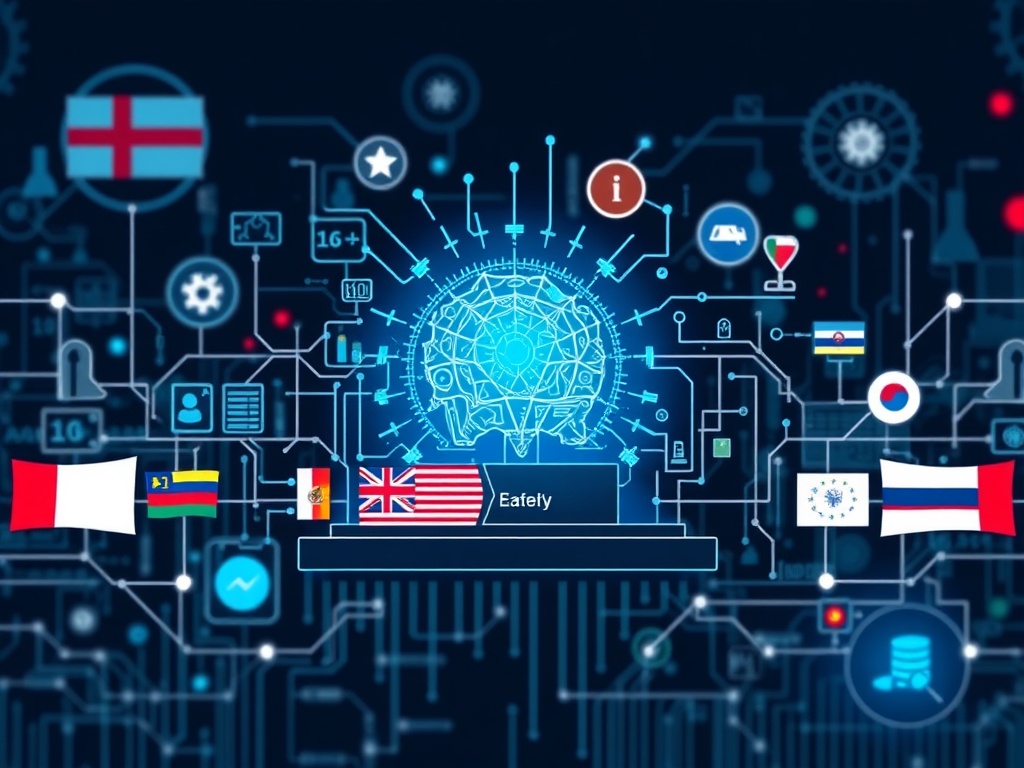In an era where the intertwining of technology and society deepens, sovereign AI frameworks are becoming pivotal in ensuring that enterprises harness artificial intelligence responsibly and legally. This article explores how these frameworks couple ethical governance with regulatory compliance to nurture AI systems that remain within national borders and uphold the highest standards of fairness, transparency, and accountability.
Understanding Sovereign AI Frameworks
Understanding Sovereign AI Frameworks:
Sovereign AI frameworks represent a pivotal shift in how AI systems are governed and deployed, reflecting an evolving landscape where ethical governance and regulatory compliance are not merely add-ons but foundational elements. At their core, these frameworks are about creating a national strategy and technical architecture that ensures Artificial Intelligence operates within a country’s legal and ethical boundaries. This includes managing data privacy, cultural and linguistic relevance, national security, and the operational infrastructure necessary for upholding sovereignty in AI deployments.
Data privacy and control take precedence in sovereign AI frameworks. With increasing concerns over data breaches and unauthorized access, these frameworks ensure that AI data processing and storage occur within national borders. This not only aligns with data residency laws like the General Data Protection Regulation (GDPR) in the European Union but also addresses broader concerns about foreign surveillance and data sovereignty. By doing so, sovereign AI frameworks help mitigate risks associated with international data flows, reinforcing trust and confidence among users and stakeholders.
The cultural and linguistic relevance of AI systems is an area where sovereign AI frameworks truly shine. Global AI models often suffer from biases and inaccuracies when deployed in diverse cultural contexts. Sovereign AI, by design, prioritizes the development and training of AI models on local languages and cultural nuances, ensuring the technology is as relevant and fair as possible to its intended audience. This localization not only enhances user experience and satisfaction but also improves the overall effectiveness and accuracy of AI applications, from customer service bots to complex decision-making algorithms.
National security and geopolitical strategy are also critical components of sovereign AI frameworks. In an era where technology is increasingly entangled with national defense and economic competitiveness, ensuring that AI systems adhere to national security protocols is paramount. Sovereign AI frameworks provide a structured approach to safeguarding sensitive AI research and development, preventing intellectual property theft, and ensuring that AI deployments do not inadvertently compromise a nation’s security. Furthermore, these frameworks enable countries to strategize and position themselves as leaders in AI innovation, aligning technology adoption with broader geopolitical goals and alliances.
Lastly, infrastructure and energy considerations are integral to supporting sovereign AI initiatives. The computational demands of training and deploying AI models are substantial, necessitating robust, scalable, and energy-efficient infrastructure. Sovereign AI frameworks address these needs by guiding the development of national AI infrastructures that are not only capable of handling high data loads but are also aligned with sustainability goals. From data centers powered by renewable energy to the adoption of energy-efficient AI algorithms, these frameworks help ensure that the AI revolution advances in an environmentally responsible manner.
In encapsulating data privacy, cultural and linguistic adaptability, national security interests, and sustainable infrastructure, sovereign AI frameworks outline a comprehensive approach to AI governance. They embody the principle that AI should not only push the boundaries of innovation but do so in a way that is safe, ethical, and aligned with the interests and values of the society it serves. By embedding ethical governance and regulatory compliance at the heart of AI design and operation, sovereign AI frameworks are setting new industry standards for responsible and sustainable AI development and deployment.
Ethical Governance as a Cornerstone of AI Systems
Building upon the foundational understanding of sovereign AI frameworks, it’s pivotal to delve into the role of ethical governance as the bedrock of AI systems. Ethical governance in AI is not merely an extension of compliance or a check-box exercise; it is an integral part of the AI lifecycle, influencing decisions from conception to deployment and beyond. Sovereign AI frameworks are rapidly setting industry benchmarks by embedding ethical governance mechanisms directly into the AI design and operational practices, ensuring these systems not only comply with national regulations but also adhere to the highest ethical standards.
At the core of ethical governance is the translation of abstract ethical principles into actionable, transparent policies that govern AI development and use. These principles include fairness, accountability, transparency, and privacy—each serving as a pillar to support the ethical deployment of AI technologies. Sovereign AI frameworks operationalize these principles through built-in processes for ethical considerations, such as bias detection and mitigation strategies, transparent algorithms for explainability, and robust privacy safeguards that align with global standards like the GDPR, thus ensuring data protection and user rights are at the forefront.
Additionally, sovereign AI frameworks emphasize the importance of continuous compliance monitoring and ethics reviews throughout the AI lifecycle. This approach not only addresses the dynamic nature of AI and its applications but also ensures that AI systems remain aligned with evolving ethical standards and regulatory requirements. By integrating real-time auditing capabilities and mechanisms for ethical oversight, organizations can proactively manage risks and adapt to regulatory changes, thereby fostering a culture of responsible AI use.
The ethical governance within sovereign AI frameworks also extends to accountability mechanisms. These frameworks establish clear lines of responsibility for AI decisions, ensuring that there is always a human element involved in the oversight of AI systems. This human oversight is crucial for sensitive sectors such as healthcare and finance, where AI decisions have significant implications. By embedding accountability measures, such as traceability of AI decisions and providing avenues for redressal in case of errors or biases, sovereign AI frameworks ensure that organizations can build trust with their stakeholders and users.
Data sovereignty, a principle closely linked with ethical governance, ensures that AI processing and data storage occur within national borders, thereby adhering to local data protection laws and regulations. This aspect of sovereign AI addresses concerns over foreign data access, enhances privacy protections, and improves trust in AI applications by ensuring data is handled in compliance with local standards.
Embedding ethical governance into the fabric of AI systems through sovereign AI frameworks offers numerous benefits, including enhanced trust in AI applications by users and stakeholders, reduced risks of bias and discrimination, and increased alignment with international ethical standards. Moreover, by fostering a culture of ethical AI use, organizations can navigate the complex regulatory landscape more effectively, ensuring that innovation in AI is both responsible and sustainable.
As we progress to the next chapter, which focuses on embedding regulatory compliance in AI, it is clear that ethical governance serves as a foundational element that supports compliance efforts. Without a solid ethical framework, ensuring regulatory compliance becomes a fragmented and reactive process rather than a proactive and integrated approach. The upcoming discussion will further explore how regulatory compliance is incorporated into the AI lifecycle, building on the ethical governance practices outlined in this chapter.
Embedding Regulatory Compliance in AI
In the rapidly evolving landscape of artificial intelligence (AI), sovereign AI frameworks have emerged as a pivotal enabler for embedding regulatory compliance directly into the DNA of AI systems. These frameworks, by design, incorporate stringent compliance measures right from the early stages of AI development, ensuring that every component, from data ingestion to model deployment, adheres to local and international legal standards. This chapter delves into the nuanced practices essential for achieving and maintaining AI compliance, addressing the complexities of policy development, data protection, auditing processes, and the strategic use of AI technologies to bolster compliance efforts.
At the heart of regulatory compliance in AI lies the development and implementation of robust policy frameworks. These frameworks are meticulously designed to translate overarching legal and ethical mandates into actionable guidelines that govern AI development and deployment. For instance, in compliance with the General Data Protection Regulation (GDPR) in the European Union, AI systems are required to incorporate data privacy measures by design and default, ensuring the protection of personal data throughout the AI lifecycle. Similarly, the burgeoning regulatory landscape in the United States, including sector-specific regulations and the proposed AI Bill of Rights, underscores the necessity for AI systems to uphold principles of fairness, accountability, and transparency.
Data protection stands as a cornerstone of regulatory compliance, demanding rigorous methodologies to secure data against unauthorized access and breaches. Sovereign AI frameworks prioritize data residency, ensuring that all personal data is processed and stored within the confines of national borders. This approach not only reinforces data sovereignty but also aligns with local data protection laws, minimizing cross-border data transfer issues. Encryption, anonymization, and pseudonymization are employed as critical techniques to safeguard data, while comprehensive data governance models oversee the collection, storage, usage, and deletion of data in compliance with legal obligations.
Auditing processes are instrumental in validating the compliance of AI systems. These processes involve regular assessments to scrutinize AI models for bias, discrimination, and adherence to privacy regulations. Internal and external audits are conducted to ensure continuous compliance, with mechanisms in place for reporting violations and non-compliance. Tools and methodologies like AI impact assessments and algorithmic audits are increasingly being adopted to evaluate the social and ethical implications of AI, ensuring that systems are not only legally compliant but also ethically sound.
Leveraging AI technologies to enhance compliance is an innovative and increasingly crucial practice. AI-driven tools are being deployed to automate compliance tasks, such as monitoring for regulatory changes and updating compliance protocols accordingly. These tools can significantly reduce the burden of manual compliance tasks, offering real-time insights into potential compliance risks and facilitating a more dynamic approach to regulatory adherence.
As organizations navigate the global regulatory landscape, with varying approaches from the European Union’s comprehensive GDPR to the United States’ emerging AI regulatory initiatives, the integration of sovereign AI frameworks has become indispensable. These frameworks enable organizations to proactively address compliance, design AI systems with regulatory requirements in mind, and implement continuous monitoring and auditing mechanisms. Through this integration, enterprises are not only mitigating legal and reputational risks but also fostering trust and reliability in their AI deployments, ensuring that innovation proceeds hand in hand with ethical and legal responsibilities.
The transition from abstract ethical governance to tangible regulatory compliance underscores a critical evolution in the AI domain. As we move towards the subsequent chapter, the focus will shift to the operationalization of sovereignty, ethics, and compliance within organizations. This progression delineates a pragmatic approach to embedding these principles into the daily operations of AI systems, highlighting the symbiotic relationship between ethical governance, regulatory compliance, and sovereign AI frameworks in innovating responsibly and sustainably in the digital age.
Operationalizing Sovereignty, Ethics, and Compliance
Operationalizing Sovereignty, Ethics, and Compliance within sovereign AI frameworks marks a transformative shift in how organizations approach the integration of artificial intelligence into their operational fabric. By embedding ethical governance and ensuring regulatory compliance directly within the design of AI systems, enterprises are now capable of fostering innovation that is not only cutting-edge but also aligned with ethical standards and legal requirements. This practical application of sovereign AI frameworks is crucial for organizations aiming to navigate the intricate landscape of local and international regulations, ethical considerations, and data sovereignty issues.
At the heart of operationalizing these frameworks is the establishment of robust governance structures. These structures are designed to oversee the entire lifecycle of AI development and deployment, ensuring that ethical considerations are factored in from the outset. For instance, fairness assessments and bias mitigation strategies are integrated into the development process, aiming to address and reduce systemic biases that may exist within AI models. Furthermore, transparency and explainability become foundational elements, allowing stakeholders to understand how AI systems make decisions, thereby enhancing trust in AI applications.
Another critical aspect of these frameworks is their emphasis on regulatory compliance by design. This approach necessitates the incorporation of features that ensure AI applications adhere to data residency laws and privacy regulations such as the General Data Protection Regulation (GDPR). By automating compliance tasks, organizations can achieve significant efficiency gains, reducing the manual effort required for compliance by up to 75%. Moreover, this proactive stance on compliance facilitates faster preparation for regulatory examinations and enhances the ability to monitor for violations in real-time. The end result is a more secure, compliant, and operationally efficient AI ecosystem.
Data residency and control are also pivotal features of sovereign AI frameworks. By mandating that data processing and storage occur within national borders, these frameworks address critical concerns regarding foreign access to sensitive information and government oversight. This localized approach to AI infrastructure not only enhances data security but also ensures that AI applications are developed in a manner that is culturally and contextually relevant to local users.
To maintain flexibility and support innovation, sovereign AI initiatives prioritize interoperability and compatibility with major AI platforms. Through the use of open standards and APIs, organizations can avoid vendor lock-in and ensure their AI systems are capable of integrating with a broad ecosystem of technologies. This flexibility allows for the rapid scaling of AI applications without compromising on sovereignty or ethical considerations.
Real-time monitoring of AI systems is another area where sovereign AI frameworks are making significant inroads. By leveraging advanced analytical tools and AI technologies, organizations can continuously monitor AI operations for compliance with ethical guidelines and regulatory requirements. This ongoing vigilance enables the timely identification and mitigation of potential issues, further embedding the principles of ethical governance and regulatory compliance into the fabric of AI systems.
Implementing controls that align with international standards and local regulations is essential for achieving efficient and secure AI operations. These controls cover a wide range of areas, including data protection, privacy, fairness, and accountability, and are critical for building trust in AI technologies among users and regulators alike. By operationalizing sovereignty, ethics, and compliance in this manner, organizations can ensure their AI initiatives are not only innovative but also responsible and sustainable.
In summary, the practical application of sovereign AI frameworks involves a holistic approach that integrates ethical governance, regulatory compliance, data sovereignty, and operational efficiency. Through robust governance structures, real-time monitoring, and a commitment to interoperability, organizations are positioning themselves to innovate safely and sustainably in the rapidly evolving AI landscape.
Future-Proofing Businesses with Sovereign AI
Future-Proofing Businesses with Sovereign AI frameworks have emerged as a beacon of innovation in the rapidly evolving ethical and compliant AI landscape. Through their comprehensive design, these frameworks are setting new industry standards by incorporating ethical governance and regulatory compliance into the core of AI systems, thus enabling enterprises to navigate the complex regulatory environment and innovate in a secure, sustainable manner. This shift is not merely a requirement but a strategic advantage that offers significant benefits in cost savings, operational efficiency, security enhancements, and cultural relevance.
Built-in Ethical Governance and Regulatory Compliance within sovereign AI frameworks has fundamentally altered the approach to AI development and deployment. By integrating ethical considerations and compliance mandates from the onset, businesses are witnessing a dramatic decrease in compliance-related expenditures and manual tasks. Automating and streamlining compliance workflows have led to up to a 75% reduction in manual oversight, allowing for more resources to be allocated to innovation and value creation. This proactive stance on ethical governance also fortifies an organization’s reputation, fostering trust among customers and stakeholders.
The emphasis on Data Residency and Control ensures that AI operations adhere to national data protection laws, such as GDPR, thereby mitigating risks associated with data sovereignty and enhancing user privacy. By localizing data processing and storage, organizations not only comply with stringent data privacy regulations but also secure critical data against unauthorized foreign access, strengthening national cybersecurity posture.
Operational and Security Benefits of adopting sovereign AI are substantial. Early adopters report not only significant cost reductions in operational expenses—ranging from 30% to 50%—but also a faster readiness for regulatory examinations, by as much as 50%. Moreover, the integration of real-time monitoring systems enhances the detection and response to potential compliance violations or security threats, thereby safeguarding the organization’s digital assets and intellectual property.
Moreover, the focus on Interoperability and Flexibility provided by sovereign AI frameworks ensures that they are adaptable and scalable to meet the evolving needs of the business. Open standards and APIs allow for seamless integration with existing systems, providing a pathway for continuous innovation without compromising on data sovereignty or compliance. This flexibility is crucial for businesses aiming to stay ahead in the competitive and fast-paced digital economy.
Lastly, the Cultural and Contextual Relevance of AI is significantly enhanced through sovereign frameworks. By prioritizing the development of AI models that are attuned to local languages, cultures, and norms, businesses can ensure that their products and services are more equitable, fair, and relevant to their targeted user demographics. This bespoke approach not only improves user engagement and satisfaction but also mitigates the risk of bias, fostering more inclusive digital environments.
In embracing sovereign AI frameworks, businesses are not just adhering to current regulatory and ethical standards but are actively future-proofing their operations against the backdrop of an anticipated increase in AI governance globally. The transition to these frameworks is a testament to the commitment of forward-thinking enterprises to sustainable, ethical innovation. Not only does this strategic shift enable businesses to leverage AI technologies more efficiently and securely, but it also positions them as leaders in the push towards a more responsible and equitable digital future.
The seamless integration of ethical governance, regulatory compliance, data sovereignty, and operational efficiency characterizes the intrinsic value of sovereign AI frameworks. As enterprises continue to navigate the digital landscape, the principles embedded within these frameworks will serve as the foundation for innovation that is not only technologically advanced but also ethically sound and globally compliant.
Conclusions
The advent of sovereign AI frameworks signifies a paradigm shift in enterprise AI adoption, enhancing the ability to innovate within the bounds of ethics and law. Embedding these comprehensive solutions is not just a regulatory necessity but a strategic impetus that fosters trust, security, and an equitable technological future.



